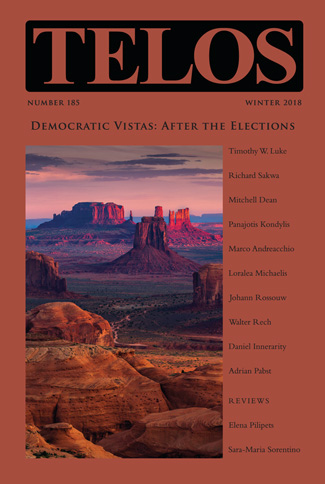Marco Andreacchio’s “Epistemology’s Political-Theological Import in Giambattista Vico” appears in Telos 185 (Winter 2018). Read the full article at the Telos Online website, or purchase a print copy of the issue in our online store. Individual subscriptions to Telos are available in both print and online formats.
 The twentieth-century rise to fame of Giambattista Vico as anticipator of historical relativism obscures essential elements of the eighteenth-century philosopher’s message. Vico’s stringent argumentation points well beyond contemporary expectations, offering a classical alternative to both a political depreciation of metaphysics and a metaphysical depreciation of politics. Carrying on a Renaissance tradition inaugurated most notably by Dante Alighieri, Vico invites us to rediscover or return to the poetic language of pagan antiquity as political-theological key to philosophical reflection upon the nature of the human mind. What Vico intends to defend are not old myths as such, but the essential independence of the human mind from any and all myths, be they ancient, medieval, or modern.
The twentieth-century rise to fame of Giambattista Vico as anticipator of historical relativism obscures essential elements of the eighteenth-century philosopher’s message. Vico’s stringent argumentation points well beyond contemporary expectations, offering a classical alternative to both a political depreciation of metaphysics and a metaphysical depreciation of politics. Carrying on a Renaissance tradition inaugurated most notably by Dante Alighieri, Vico invites us to rediscover or return to the poetic language of pagan antiquity as political-theological key to philosophical reflection upon the nature of the human mind. What Vico intends to defend are not old myths as such, but the essential independence of the human mind from any and all myths, be they ancient, medieval, or modern.
With the understanding that the human mind can discover its essence only through its fictions, Vico sets out to foster awareness of the original function of language as carrier of “things” into the mind (as ideas) and out of the mind (as sensory objects). The natural end of language would be neither the reduction of the physical to the metaphysical, nor the reduction of the latter to the former, nor again a reduction of reality to language, but the sustaining of both the physical and the metaphysical in a “cycle” reflecting the ultimate irreducibility or “indefinite nature” of the human mind. It is an indefinite nature, on account of which the human mind fails to see itself in and through itself alone, that provides the basis for Vico’s interpretation of Christianity as a blessing in disguise.



